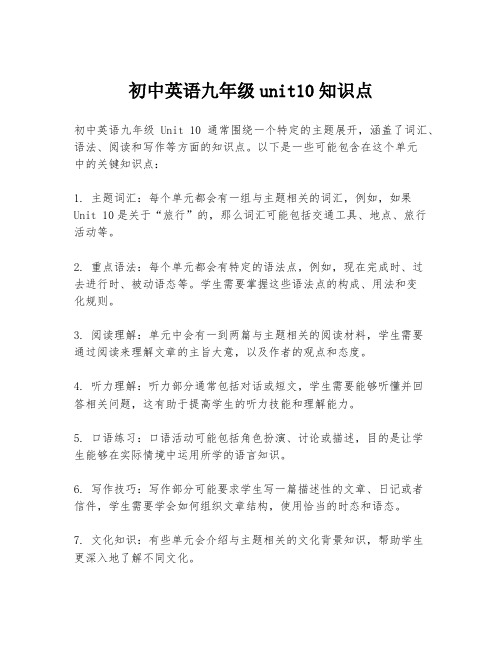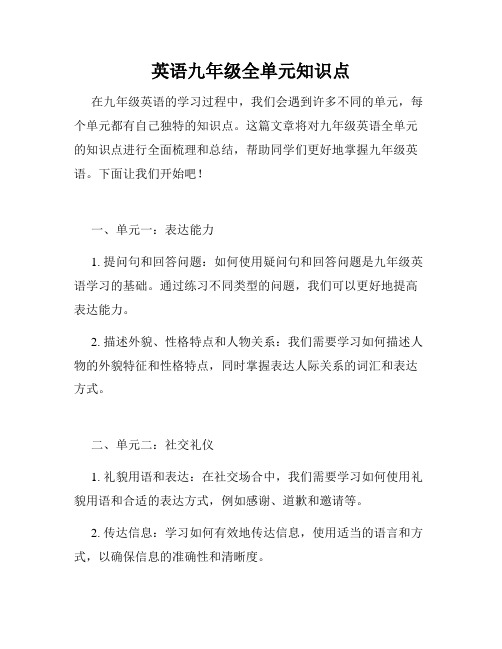初三英语单元知识点(合集10篇)
九年级英语 各章知识点

九年级英语各章知识点Unit 1: Personal InformationIn the ninth grade English curriculum, students will cover various knowledge points throughout different units. In this article, we will explore the knowledge points taught in each chapter.Chapter 1: Personal InformationThis chapter focuses on introducing and discussing personal information. Students will learn how to effectively communicate personal details, including name, age, nationality, and hobbies. Furthermore, they will also grasp the usage of pronouns, possessive adjectives, and possessive pronouns in English language.Chapter 2: FamilyIn this chapter, students will deepen their understanding of family relationships and learn related vocabulary. They will explore how to describe family members, including parents, siblings, and extended family. Additionally, the unit will cover interrogative pronouns and the usage of "there is" and "there are" to describe family size and relationships.Chapter 3: School LifeChapter 3 revolves around school life and aims to broaden students' vocabulary related to the classroom and school activities. They will learn words related to subjects, classroom objects, and extracurricular activities. Moreover, the chapter will cover the usage of prepositions to describe the location of objects and people.Chapter 4: Daily RoutineIn this chapter, students will delve into the topic of daily routines and learn vocabulary related to daily activities. They will learn to express their own daily routines and ask about others' routines using appropriate time markers. Additionally, the unit will cover adverbs of frequency to convey the frequency of different activities.Chapter 5: Food and Healthy LivingChapter 5 focuses on expanding students' vocabulary related to food and discussing healthy living habits. They will learn about different types of food, food groups, and learn how to express preferences, likes, and dislikes. Furthermore, the unit will cover the usage of modal verbs to give advice and make suggestions for maintaining a healthy lifestyle.Chapter 6: Travel and TransportationThis chapter explores vocabulary related to travel and transportation. Students will learn words related to different modes of transportation, travel destinations, and necessary questions and phrases for travel situations. They will also practice using comparative and superlative adjectives to compare different means of transportation.Chapter 7: Holidays and FestivalsIn this chapter, students will learn about holidays and festivals celebrated in English-speaking countries. They will expand their vocabulary related to different holidays and traditions. Additionally, they will practice using present continuous tense to describe ongoing celebrations and activities during specific holidays.Chapter 8: Environmental IssuesChapter 8 focuses on raising awareness about environmental issues. Students will learn vocabulary related to environmental problems, actions to protect the environment, and discuss possible solutions. The unit will also cover the usage of modal verbs to express obligations and suggestions for environmental conservation.Chapter 9: Future Plans and CareersIn this final chapter, students will explore vocabulary related to future plans and careers. They will learn how to talk about future aspirations, employment, and discuss potential career paths. Moreover, they will practice using future tense and conditional sentences to express future possibilities and goals.Throughout the ninth-grade English curriculum, students will cover these knowledge points, gradually building their English language skills and enhancing their ability to communicate effectively in various contexts.。
九年级全册英语单元知识点总结

九年级全册英语单元知识点总结九年级英语是初中学习的最后一年,涵盖了很多重要的知识点。
在这篇文章中,我们将总结九年级全册英语单元的重点内容,帮助同学们进行复习和回顾。
Unit 1-3: 基础语法和词汇这几个单元主要涉及英语语法和词汇的基础知识。
学生们将学习一般过去时、一般现在时、一般将来时等各种时态的用法,以及被动语态、条件句等语法结构的运用。
此外,词汇部分包括了动词短语、形容词和副词的比较级与最高级等内容。
Unit 4-6: 阅读理解和写作技巧这几个单元着重培养学生的阅读和写作能力。
学生们将学习如何读懂课文、提取关键信息、推断含义等阅读理解技巧。
同时,写作部分将涵盖写作结构、写作方法以及如何组织语言和写作技巧等内容。
Unit 7-9: 口语表达与听力训练这几个单元注重培养学生的口语和听力能力。
学生们将通过角色扮演、对话练习等方式来提高自己的口语表达能力。
同时,听力部分将涵盖各种听力材料,如对话、短文等,以提高学生对英语的听力理解能力。
Unit 10-12: 名著赏析和文学写作这几个单元的重点是学习名著和进行文学写作。
学生们将通过阅读名著如《雾都孤儿》等,了解不同文学作品中的人物、情节和主题等内容。
同时,在写作方面,学生们将学习文学写作的技巧和方法,如描写人物、构思情节等。
Unit 13-15: 实用口语和生活技能这几个单元主要注重培养学生实际生活中使用英语的能力。
学生们将学习日常交际用语、电话英语、旅行英语等实用口语,并进行实际交际和情境对话练习。
此外,还会学习一些常用的生活技能,如问路、购物等。
Unit 16-18: 考试技巧和学习策略这几个单元的重点是学习考试技巧和学习策略。
学生们将学习如何做题和备考英语考试,包括做题技巧、解题方法以及时间管理等。
同时,还将介绍一些学习策略,如记忆技巧、提高学习效率等,以帮助学生更好地学习英语。
通过对九年级全册英语单元知识点的总结,我们可以了解到不同单元的重点内容和学习目标。
九年级英语知识点单元归纳

九年级英语知识点单元归纳Unit 1: Friends and Relationships- Vocabulary: Words related to friendships and relationships- Grammar: Present simple and present continuous tenses in describing routines and activities- Reading: Texts about friendships and relationships- Writing: Informal letters and emailsUnit 2: Health and Fitness- Vocabulary: Words and phrases related to health and fitness- Grammar: Present simple passive voice in describing health issues- Reading: Articles about healthy lifestyle and fitness tips- Writing: Descriptive paragraphs about personal health habitsUnit 3: Travel and Tourism- Vocabulary: Words related to travel and tourism- Grammar: Past simple tense to describe past travel experiences- Reading: Travel brochures and guides- Writing: Personal travel narrativesUnit 4: Environment and Conservation- Vocabulary: Words and phrases related to environment and conservation- Grammar: Modal verbs and adjectives in expressing preferences and opinions about environmental issues- Reading: Articles and essays about environmental problems and solutions- Writing: Persuasive essays on environmental issuesUnit 5: School Life- Vocabulary: Words and phrases related to school life- Grammar: Comparative and superlative adjectives to compare people and things- Reading: Interviews with students and teachers- Writing: Reflections on school experiencesUnit 6: Cultural Diversity- Vocabulary: Words related to cultural diversity and traditions- Grammar: Reported speech to report what someone else said- Reading: Texts about different cultures and traditions- Writing: Research reports on different cultural practicesUnit 7: Science and Technology- Vocabulary: Words and phrases related to science and technology - Grammar: Future forms to talk about future plans and possibilities - Reading: Scientific articles and news reports- Writing: Opinion pieces on the impact of technology on societyUnit 8: Celebrations and Festivals- Vocabulary: Words and phrases related to celebrations and festivals- Grammar: Present perfect tense to talk about past experiences and events- Reading: Texts about various celebrations and festivals around the world- Writing: Descriptive essays on personal or cultural celebrations Unit 9: Jobs and Careers- Vocabulary: Words and phrases related to jobs and careers- Grammar: Conditional sentences to talk about hypothetical situations- Reading: Job advertisements and career profiles- Writing: Job application letters and resumes以上是九年级英语知识点的单元归纳,每个单元包括了相应的词汇、语法、阅读和写作练习。
九年级英语上册各单元知识点归纳

九年级英语上册各单元知识点归纳第一单元:基础知识1. 介词短语的使用:介词短语是由一个介词和它的宾语组成的短语,用来表示时间、地点、方向、原因等。
例如:"on the table"(在桌子上),"in the park"(在公园里)。
介词短语在句子中作状语、定语、宾语等。
需要注意介词与宾语之间的搭配。
2. 动词的时态和语态:英语中的动词有多种时态和语态。
常见的时态有一般现在时、一般过去时、一般将来时等。
常见的语态有主动语态和被动语态。
时态用于表示动作发生的时间,语态用于表示动作的执行者。
例如:"She is reading a book."(她正在读一本书)。
需要注意时态和语态的用法和变化规则。
3. 名词的单复数形式:英语中的名词有单数和复数形式。
复数形式一般是在名词后面加-s或-es。
有些名词的复数形式较特殊,需要记忆。
例如:"a cat"(一只猫)的复数形式是"cats"(多只猫)。
需要注意名词的单复数形式在句子中的搭配和用法。
第二单元:阅读理解1. 完型填空:完型填空是一种考察学生对语境理解和词汇运用能力的题型。
在完型填空中,通常给出一篇文章和一些空格,要求学生根据文章内容和语境选择正确的单词或短语填入空格中。
通常需要结合文章整体逻辑和上下文意义来填写正确答案。
2. 阅读理解题:阅读理解题是一种考察学生阅读理解能力和推理能力的题型。
通常会给出一篇短文或文章,然后根据文章内容提出一些问题,要求学生根据文章内容和推理来回答问题。
需要学会熟练阅读和理解文章,抓住关键信息和主题,并能运用推理等能力来回答问题。
第三单元:语法知识1. 直接引语和间接引语:在英语中,当我们引述别人的话时,可以使用直接引语和间接引语。
直接引语是直接引用别人所说的话,使用引号将其包围;间接引语是将别人所说的话转述出来。
例如:直接引语:"I am happy," she said.(她说:“我很开心。
初中英语九年级unit10知识点

初中英语九年级unit10知识点初中英语九年级Unit 10通常围绕一个特定的主题展开,涵盖了词汇、语法、阅读和写作等方面的知识点。
以下是一些可能包含在这个单元中的关键知识点:1. 主题词汇:每个单元都会有一组与主题相关的词汇,例如,如果Unit 10是关于“旅行”的,那么词汇可能包括交通工具、地点、旅行活动等。
2. 重点语法:每个单元都会有特定的语法点,例如,现在完成时、过去进行时、被动语态等。
学生需要掌握这些语法点的构成、用法和变化规则。
3. 阅读理解:单元中会有一到两篇与主题相关的阅读材料,学生需要通过阅读来理解文章的主旨大意,以及作者的观点和态度。
4. 听力理解:听力部分通常包括对话或短文,学生需要能够听懂并回答相关问题,这有助于提高学生的听力技能和理解能力。
5. 口语练习:口语活动可能包括角色扮演、讨论或描述,目的是让学生能够在实际情境中运用所学的语言知识。
6. 写作技巧:写作部分可能要求学生写一篇描述性的文章、日记或者信件,学生需要学会如何组织文章结构,使用恰当的时态和语态。
7. 文化知识:有些单元会介绍与主题相关的文化背景知识,帮助学生更深入地了解不同文化。
8. 语言功能:每个单元都会有一些语言功能,如提出请求、表达同意或不同意、表达喜好等,学生需要学会在适当的情境中使用这些功能。
9. 综合运用:单元的最后通常会有一个综合运用部分,要求学生将所学的语言知识应用到一个具体的任务或项目中。
请注意,具体的知识点会根据不同的教材和课程设置有所不同。
以上内容仅供参考,具体的教学内容应以实际使用的教材为准。
九年级英语全册各单元知识点总结

九年级英语全册各单元知识点总结Unit 1 How can we become good learners?一、短语:1.have conversation with sb. 同某人谈话2.connect …with… 把…和…连接/联系起来3.the secret to… ……的秘诀4.be afraid of doing sth./to do sth. 害怕做某事5.look up 查阅6.repeat out loud 大声跟读7.make mistakes in 在……方面犯错误8.get bored 感到厌烦9.be stressed out 焦虑不安的10.pay attention to 注意;关注11.depend on 取决于;依靠12.the ability to do sth. 做某事的能力二、知识点:1. by + doing:通过……方式(by是介词,后面要跟动名词,也就是动词的ing形式);2. a lot:许多,常用于句末;3. aloud, loud与loudly的用法,三个词都与“大声”或“响亮”有关。
①aloud是副词,通常放在动词之后。
②loud可作形容词或副词。
用作副词时,常与speak, talk, laugh等动词连用,多用于比较级,须放在动词之后。
③loudly是副词,与loud同义,有时两者可替换使用,可位于动词之前或之后。
4. not …at all:一点也不,根本不,not经常可以和助动词结合在一起,at all 则放在句尾;5. be / get excited about sth.:对…感到兴奋;6. end up doing sth:终止/结束做某事;end up with sth.:以…结束;7. first of all:首先(这个短语可用在作文中,使得文章有层次);8. make mistakes:犯错make a mistake 犯一个错误;9. laugh at sb.:笑话;取笑(某人)(常见短语)10. take notes:做笔记/记录;11. native speaker 说本国语的人;12. make up:组成、构成;13. deal with:处理、应付;14. perhaps = maybe:也许;15. go by:(时间)过去;16.each other:彼此;17.regard… as … :把…看作为…;18.change… into…:将…变为…;19. with the help of sb. = with one's help 在某人的帮助下(注意介词of和with,容易出题)20. compare … to …:把…比作… compare with 拿…和…作比较;21. instead:代替,用在句末,副词;instead of sth / doing sth:代替,而不是(这个地方考的较多的就是instead of doing sth,也就是说如果of后面跟动词时,要用动名词形式,也就是动词的ing形式)22.Shall we/ I + do sth.? 我们/我…好吗?23. too…to:太…而不能,常用的句型是too+形容词/副词+ to do sth.Unit 2 I think that moon cakes are delicious!一、短语:1. the Lantern Festival 元宵节2. the Dragon Boat Festival 端午节3. the Water Festival 泼水节4. remind sb. of 使某人想起5. eat five meals a day 一天吃五餐6. put on five pounds 体重增加了五磅7. treat sb. with. 用/以……对待某人8. be similar to... 与.......相似9. end up 最终成为/处于10. share sth. with sb. 与……分享……11. as a result结果12. one... the other... (两者中的) 一个…另一个…13. take sb. out for dinner 带某人出去吃饭14. dress up 乔装打扮15. haunted house 鬼屋16. the beginning of new life 新生命的开始二、知识点:1.宾语从句:(三大考点:引导词、时态和语序。
九年级英语unit10知识点归纳总结

九年级英语unit10知识点归纳总结九年级英语Unit 10知识点归纳总结九年级英语Unit 10主要包含了“Pollution”(污染)这一主题。
本单元的学习目标主要集中在以下几个方面:污染的种类、对环境的影响、如何保护环境以及呼吁人们行动起来。
一、污染的种类1. 空气污染学习污染产生的原因、影响以及如何改善空气质量。
例如,汽车尾气、工厂废气等对空气质量的污染。
2. 水污染探讨水污染的原因、对生态系统和人类健康的危害,以及如何净化水源。
例如,废弃物和化学物质对水体的污染。
3. 声音污染了解噪声对人们身心健康的影响,以及减少噪音污染的方法。
比如,交通、工厂和建筑施工等带来的噪音。
二、对环境的影响1. 污染对生态系统的影响学习了解污染对自然环境、动植物以及生态平衡的危害。
指出如何保护生态平衡,减少人类活动对自然环境的破坏。
2. 污染对人类健康的影响探讨污染对人类健康的潜在风险,如呼吸系统疾病、水源感染等。
呼吁保护环境、减少对污染物的暴露,以改善人类的健康状况。
三、保护环境的方法1. 减少污染源介绍如何减少污染产生的源头,例如使用清洁能源、改善工业和农业生产过程等。
2. 回收利用强调废物的回收利用,减少对资源的浪费,并推广环保意识。
3. 提倡低碳生活鼓励人们采取低碳生活方式,如步行、骑自行车或使用公共交通工具,减少汽车尾气对空气的污染。
四、呼吁行动号召人们行动起来,通过个人的努力来保护环境。
我们每个人都应该采取行动,保护我们的地球家园。
五、总结本单元主要介绍了“Pollution(污染)”这一主题。
通过学习相关知识,我们深刻认识到污染的严重性以及对环境和人类健康的影响。
只有我们每个人都积极行动起来,减少污染、保护环境,才能创造一个更美好的未来。
总之,通过学习九年级英语Unit 10中的知识点,我们能够更好地了解污染的种类、对环境的影响,以及如何保护环境和呼吁人们行动起来。
希望大家能够认真对待这一问题,并为保护地球共同努力。
英语九年级全单元知识点

英语九年级全单元知识点在九年级英语的学习过程中,我们会遇到许多不同的单元,每个单元都有自己独特的知识点。
这篇文章将对九年级英语全单元的知识点进行全面梳理和总结,帮助同学们更好地掌握九年级英语。
下面让我们开始吧!一、单元一:表达能力1. 提问句和回答问题:如何使用疑问句和回答问题是九年级英语学习的基础。
通过练习不同类型的问题,我们可以更好地提高表达能力。
2. 描述外貌、性格特点和人物关系:我们需要学习如何描述人物的外貌特征和性格特点,同时掌握表达人际关系的词汇和表达方式。
二、单元二:社交礼仪1. 礼貌用语和表达:在社交场合中,我们需要学习如何使用礼貌用语和合适的表达方式,例如感谢、道歉和邀请等。
2. 传达信息:学习如何有效地传达信息,使用适当的语言和方式,以确保信息的准确性和清晰度。
三、单元三:生活方式1. 健康和保健:了解保持健康的重要性,学习如何描述健康问题及其解决方案。
2. 生活习惯:学习不同的生活习惯和方式,如饮食、运动等,并学会表达自己的观点和建议。
四、单元四:旅游与地理1. 问路和指路:学习如何问路和指路,包括使用地理方向、路标以及描述地点的词汇。
2. 旅行经验:通过学习旅行相关的词汇和表达方式,我们可以更好地描述自己的旅行经验,并了解不同的旅游目的地。
五、单元五:文化与艺术1. 文化习俗:学习各国文化、传统节日等,了解不同文化之间的差异和相似之处。
2. 艺术形式:学习不同类型的艺术形式,如音乐、绘画、戏剧等,并学会表达对艺术作品的欣赏和评价。
六、单元六:信息时代1. 电子设备与媒体:了解不同类型的电子设备和媒体资源,如电视、互联网和社交媒体等,并了解如何使用它们。
2. 数字化学习资源:学习如何使用数字化学习资源,如在线课程、电子书等。
七、单元七:未来展望1. 职业规划:通过学习不同职业和行业的相关信息,我们可以为自己的未来规划做出更好的决策。
2. 未来趋势:了解未来社会和科技的发展趋势,探索未来可能面临的挑战和机遇。
- 1、下载文档前请自行甄别文档内容的完整性,平台不提供额外的编辑、内容补充、找答案等附加服务。
- 2、"仅部分预览"的文档,不可在线预览部分如存在完整性等问题,可反馈申请退款(可完整预览的文档不适用该条件!)。
- 3、如文档侵犯您的权益,请联系客服反馈,我们会尽快为您处理(人工客服工作时间:9:00-18:30)。
初三英语单元知识点(合集10篇)初三英语单元知识点第1篇【重点短语和句型】have a good summer holiday 暑假过得愉快come back from 从回来have/has been to 去过have/has gone to 去了more 再也不take photos 照相by the way 顺便问一下take part in 参加around/all over/throughout the world 全世界tell something 告诉某人关于某事have/live a happy/hard life 过着幸福/艰苦的生活detail 详细描述give support to 支持亲眼看见keep in touch with 与保持联系far away 遥远的kinds/sorts of 各种各样的not also 不仅而且make progress 取得进步more than/over 多于develop/improve rapidly 迅速发展/改善tell (not ) to do 告诉某人(别)做某事ask (not ) to do 要求某人(别)做某事in order to do 为了做某事have to do 不得不做某事It's +形容词+for to do 对于某人来说做某事是的why not do 为什么不做某事succeed/be successful in doing 成功地做某事dream about doing 梦想做某事see/hear do/doing 看见/听见某人做/正在做某事【重点语法】现在完成时一. 现在完成时的基本结构肯定句:主语+have/has+动词的过去分词+其他否定句:主语+have/has+not+动词的过去分词+其他一般疑问句:Have/Has+主语+动词的过去分词+其他特殊疑问句:特殊疑问词+一般疑问句(have/has+主语+过去分词+其他)二. 现在完成时的用法现在完成时用来表示过去已经完成的动作对现在造成影响或后果。
也就是说,动作或状态发生在过去但它的影响现在还存在,强调的是现在。
I have already posted the 我已经邮寄出了照片。
与此种用法连用的时间状语时一些模糊的过去时间状语,如already(肯定句句中), yet(否定句/疑问句句尾), just, before, recently,still, lately,never等。
现在完成时也可用来表示动作或状态发生在过去某一时刻,持续到现在并且有可能会继续持续下去。
He has lived here since 自从1978年以来,他一直住在这儿。
(动作起始于1978年,一直住到现在,可能还要继续住下去。
) 此种用法常与for(+时间段),since(+时间点或过去时的句子)连用。
谓语动词必须是延续性动词。
有些瞬间动词可变为延续动词:go out----be outfinish----be overopen----be opendie----be deadbuy---havefall ill---be illcome back----be backcatch a cold----have a cold初三英语单元知识点第2篇Unit 2 I think that delicious!【短语归纳】the Lantern Festival 元宵节the Dragon Boat Festival 端午节 the Water Festival 泼水节be fun to watch 看着很有意思eat five meals a day 一天吃五餐 put on five pounds 体重增加了五磅 in two weeks 两星期之后be similar 与相似end up最终成为;最后处于share with 与……分享……as a result 结果dress up 乔装打扮haunted house 鬼屋call out 大声呼喊remind of 使某人想起sound like 听起来像treat 用/以……对待某人the beginning of new life 新生命的开始【考点详解】What + a(n) + 形容词 + 可数名词的单数形式+主语+谓语+其他)! 多么……的……!How + 形容词/副词(+主语+谓语+其他)! ……多么……!be going to 将要/打算……in + 时间段在……后give to 给某人某物;把某物给某人plan to do 计划做某事refuse to do 拒绝做某事one of + 名词复数形式……之一【重点语法】一、宾语从句宾语从句在复合句中作主句的宾语。
三大考点:引导词、时态和语序。
其中,语序必须是陈述句语序。
常由下面的一些词引导:①由that 引导,表示陈述意义,that可省略He says (that) he is at 他说他在家里。
②由if , whether引导,表示一般疑问意义(带有是否、已否、对否等)I don’t know if / whether Wei Hua likes 我不知道韦华是否喜欢鱼。
③由连接代词、连接副词(疑问词) 引导,表示特殊疑问意义Do you know what he wants to buy? 你知道他想要买什么吗?从句时态要与主句一致当主句是一般现在时,从句根据情况使用任何时态当主句是一般过去时,从句应使用过去某时态(一般过去时,过去进行时,过去将来时,过去完成时)He said (that) he was at 他说他在家里。
I didn’t know that she was singing 我不知道她正在唱歌。
She wanted to know if I had finished m 她想要知道我是否已经完成了我的作业。
Did you know when he would be back? 你知道他将会什么时候回来?二、感叹句感叹句是表达喜、怒、哀、乐以及惊奇、惊讶等强烈感情的句子。
感叹句通常由 what 或 how 引导。
现分述如下:由 what 引导的感叹句,其句子结构可分为以下三种:①可用句型:“ What + a/an +形容词+可数名词单数+主语+谓语+ 其他!”。
如:What a nice present it is! 它是一件多么好的礼物啊!②可用句型:“ What +形容词+可数名词复数+主语+谓语+ 其他!”。
如:What beautiful flowers they are! 多么漂亮的花啊!③可用句型:“ What +形容词+不可数名词+主语+谓语+ 其他!”。
如: What fine weather it is today! 今天天气多好啊!由 how 引导的感叹句,其句子结构也分为三种:①可用句型:“ How +形容词 / 副词+主语+谓语+ 其他!”。
如:How careful she is! 她多么细心啊!How fast he runs! 他跑得多快啊!②可用句型:“ How +形容词+ a/an +可数名词单数+主语+谓语!”。
如:How beautiful a girl she is! 她是个多么漂亮的姑娘啊!③可用句型:“ How+主语+谓语!”。
如:How time flies! 光阴似箭!由 what 引导的感叹句与由 how 引导的感叹句有时可以转换,但句中部分单词的顺序要有所变化。
如:How beautiful a girl she is! = What a beautiful girl she is!What delicious cakes these are! = How delicious these cakes are! Unit 3 Could you please are?【重要短语】used to do 过去常常做某事be afraid of 害怕from time to time 时常;有时turn red 变红take up 开始做,从事,占据(时间、空间)deal with 对付;应付not…any more 不再tons of attention 很多关注worry about 担心be careful 当心hang out 闲逛give up 放弃thank about 考虑a very small number of…极少数的……be alone 独处give a speech 做演讲【考点详解】①问路常用的句子:Do you know where is … ?Can you tell me how can I get to …?Could you tell me how to get to …?②Can/Could/Will/Would you please tell me 表示十分客气地询问事情③Could you tell me how to get to the park? 请你告诉我怎么才能去邮局好吗?上面句子中的how to get to the park是疑问词与动词不定式连用,用作宾语,但不是宾语从句(这一点要搞清楚,它不是宾语从句),相当于how I can get to the park(宾语从句)I don't know how to solve the problem=I don't know how I can solve the 我不知道如何解决这个问题Can you tell me when to leave? =Can you tell me when I will leave? 你能告诉我什么时候离开?日常交际用语:take the elevator / escalator to the … floor 乘电梯/自动扶梯到…楼turn left / right == take a left / right 向左/ 右转go straight 向前直走(straight这个词经常考)next to 旁边、紧接着(常见短语)Lily is next to 莉莉就在安的旁边。
between…and…在…和…之间Lily is between Ann and 莉莉就在安和汤姆的之间。
Is that a good place to hang out? 那是不是一个闲荡的好地方?上面句子中的to hang out修饰前面的名词place,是不定式作定语。
expensive 贵的反义词:inexpensive 不贵的crowded 拥挤的反义词:uncrowded 不拥挤的take a vacation == go on a vacation 去度假dress up 打扮 dress up as 打扮成He wanted to dress up as Father 他想要打扮成圣诞老人。
